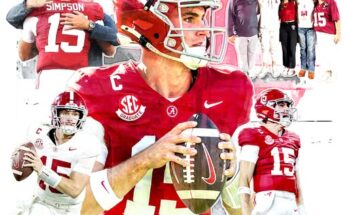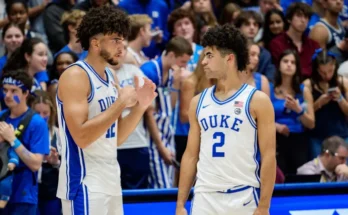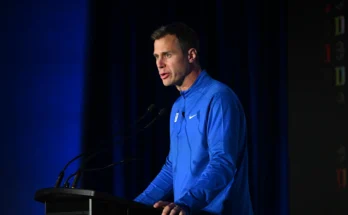Pettiford stated that he will return to Auburn Men’s Basketball if he does not anticipate having a guaranteed contract in hand following the NBA Combine, meetings, and workouts.
AUBURN, Ala. — Just days after officially declaring for the 2025 NBA Draft, Auburn freshman guard Tahaad Pettiford surprised many by revealing that his future with the Tigers isn’t entirely behind him. In a statement released to reporters, Pettiford acknowledged that while his goal is to reach the NBA, he won’t make the leap unless a guaranteed contract is within reach.
“If I don’t feel like I’m in a position to have a guaranteed contract after the combine, interviews, and workouts,” Pettiford said, “then I’ll be back at Auburn next season. Simple as that.”
It’s a mature, calculated approach for a player just a year removed from high school — and one that puts head coach Bruce Pearl and the entire Auburn basketball program in a uniquely hopeful position heading into the summer.
Pettiford arrived at Auburn as one of the crown jewels of Bruce Pearl’s 2024 recruiting class — a dynamic 6-foot-1 guard from Hudson Catholic (N.J.), ranked No. 26 in the ESPN Top 100. His explosive first step, court vision, and perimeter scoring ability made him a tantalizing prospect for the Tigers’ fast-paced, guard-oriented offense.
In his freshman campaign, Pettiford averaged 10.6 points, 3.2 assists, and 1.5 steals in 22 minutes per game off the bench, while shooting 36% from three and 79% from the free-throw line. Though inconsistent at times — as many young guards are — Pettiford turned heads with several electric performances, including a 24-point outing against Alabama and a 6-assist performance in the Tigers’ NCAA Tournament win over Kansas State.
“He showed us why he’s got NBA tools,” said Pearl in March. “The pace he brings, the way he can break down a defense — he’s only going to get better.”
Pettiford’s decision to enter the NBA Draft wasn’t shocking in itself. The NCAA allows players to declare and participate in the pre-draft process while maintaining their eligibility, provided they do not hire an agent certified by the NBPA and withdraw by the NBA’s withdrawal deadline (usually 10 days before the draft).
But what set Pettiford apart from many other early entrants was his transparency about the conditions for staying in the draft.
“There’s a difference between being drafted and being ready,” Pettiford explained. “I’m not just chasing a two-way deal. I want to be in a position where I’m developing with a team that sees me as a long-term piece. If that’s not what’s on the table, I’ll come back, get better, and run it back with my brothers at Auburn.”
In an era of one-and-dones and early exits, Pettiford’s approach stood out — a reflection of both his character and the guidance he’s received from his inner circle.
Pettiford’s NBA evaluation is still evolving. Scouts love his quickness, ball-handling, and shot creation — tools that translate well in today’s league. But questions remain about his size, consistency, and ability to defend against bigger guards.
“He has NBA speed, no doubt,” said one Western Conference scout. “But we need to see how he performs against elite competition at the combine. Can he shoot consistently from NBA range? Can he defend in space? Those are the big questions.”
Pettiford is projected as a late second-round pick to undrafted in most current mock drafts. That puts him in a grey area — attractive enough to earn workouts and attention, but not a lock to receive a guaranteed roster spot.
While Auburn fans may have already begun imagining life without Pettiford, his comments have brought new optimism to the Plains.
Should he return, he would likely step into a starting role next season — possibly running the point alongside a core group that includes Johni Broome (if he uses his final year of eligibility), Chad Baker-Mazara, and Denver Jones.
“That’s the thing,” said Pearl. “We built a foundation this year. If guys like Tahaad decide to come back and chase something bigger, we’ll be one of the most dangerous teams in the country.”
Pearl, a veteran of managing NBA-level talent, has been supportive of Pettiford’s journey, emphasizing the importance of gathering information before making a final decision.
“He’s doing it the right way,” Pearl said. “The process is about learning where you stand, and making the best decision for your future. And if that means coming back, we’re going to welcome him with open arms.”
One major factor in Pettiford’s ability to return is the evolving landscape of college athletics. With Name, Image, and Likeness (NIL) compensation now a reality, returning to school is no longer a financial setback for elite athletes. Pettiford is reportedly already part of several NIL deals, and a second season at Auburn could significantly raise both his marketability and draft stock.
Moreover, the transfer portal looms as a dynamic factor. Auburn has already been active this offseason in recruiting veteran guards, but having clarity on Pettiford’s status is crucial before Pearl finalizes his backcourt rotation.
“You’ve got to plan for all scenarios,” one Auburn staffer told reporters anonymously. “If he’s back, we’re in a great spot. If not, we’ve got a plan. But he gives us that X-factor if he returns.”
Pettiford is expected to attend the 2025 NBA Draft Combine, which takes place May 12–19 in Chicago. There, he will have a chance to showcase his skills in front of NBA front offices, participate in interviews, and receive feedback from league personnel.
He’s also slated for individual workouts with several teams — including the Brooklyn Nets, Atlanta Hawks, and Utah Jazz, according to sources familiar with the situation.
“This is the biggest opportunity of my life so far,” Pettiford said. “But I’ve got people around me who care about me making the right decision — not just the fast one.”
That includes his family, trainers, and mentors who have been with him since his days playing AAU ball for Team Final.
If Pettiford returns, Auburn immediately becomes a top-10 team in preseason polls. Here’s how the Tigers’ backcourt could stack up:
- Tahaad Pettiford – Sophomore leader, starting point guard
- Denver Jones – Sharpshooting senior with scoring pedigree
- Holloway (incoming freshman or portal guard) – Additional depth and energy
- Tre Donaldson – If he returns, a versatile option who can play both guard spots
The return of Pettiford would allow Pearl to play faster, lean more heavily into transition offense, and give the team a go-to shot creator in crunch time.
Pettiford’s cautious but confident approach represents a shift in how young players are navigating the NBA Draft process. The NBA no longer guarantees success for second-rounders, and two-way contracts — while helpful for some — can delay development or bury players in the G League.
By evaluating his chances realistically, Pettiford is setting an example not only for Auburn players, but for college athletes across the country.
“He’s betting on himself,” said Broome. “But not in a reckless way. He knows his value, and he knows he can get better.”
Auburn coaches and teammates have made it clear — if Pettiford chooses to return, he’ll be welcomed back without reservation. There are no bridges burned, no hard feelings — just open arms.
“He’s family,” said Pearl. “And family always has a place here.”
For Auburn fans, it’s a waiting game now. The next few weeks — filled with NBA workouts, combine performances, and critical feedback sessions — will determine whether Pettiford begins his professional journey or returns to finish what he started.
Either way, the Tigers know they’ve got something special.
In an era where many young athletes rush into the next chapter, Tahaad Pettiford is showing wisdom beyond his years. He may still be NBA-bound, but he’s doing it on his terms — not because of hype or pressure, but because he’s earned it.
And if that moment isn’t now?
Then he’ll be back in orange and blue — stronger, smarter, and hungrier than ever.



